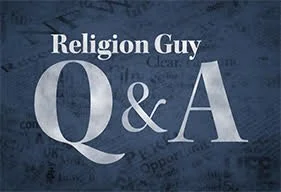THE QUESTION:
Was Jesus a Socialist?
THE RELIGION GUY’S ANSWER:
Well, no. For one thing, that term, as with rival capitalism, pertains to modern industrialized society.
The 1st Century economy consisted mostly of hand-to-mouth subsistence agriculture, along with fishermen, small-time merchants, individual craftsmen and a tiny class of wealthy overlords. But the question above was posed this month by a Wall Street Journal column, so let’s briefly scan a few aspects of Christianity and economics.
Those familiar with the New Testament will immediately think of the incident between Jesus and the “rich young ruler” recorded in three of the four Gospels (here we’ll follow Luke 18:18-27 in the RSV translation).
The ruler asks Jesus, “What shall I do to inherit eternal life?” Jesus recites several of the Ten Commandments that are to be obeyed. The ruler replies that he has done this since his youth. Jesus then tells him “one thing you still lack. Sell all that you have and distribute to the poor, and you will have treasure in heaven; and come, follow me.” The ruler “became sad, for he was very rich.”
Jesus then observes, “How hard it is for those who have riches to enter the kingdom of God! It is easier for a camel to go through the eye of a needle,” but he concludes, “What is impossible with man is possible with God.”
You can have some fun checking out commentaries on this passage online or in your local library. Softening the force of Jesus’ words (a bit too easily?), Bible experts often say this was a unique saying for one individual who was perhaps stingy and had set his heart too much on his wealth while neglecting God’s priority, that He be served through service to his needy people.
Whatever the ruler ended up doing with his wealth, we are familiar with Catholic men’s and women’s orders where those who join take voluntary vows of poverty and keep only minimal personal possessions, and the same in Buddhism.
Jesus made no such heavy demand with anyone else so it is not a requirement for salvation or church membership except in some small cults. Moreover, his “Parable of the Talents” (take a look at Matthew 25:14-30) commends entrepreneurial wisdom and spirit, though commentators typically spiritualize this into Jesus urging believers to use the gifts and abilities they’ve been given to energetically spread the kingdom of God on earth. Again, see for yourself what commentaries write about this.
Both the Hebrew Scriptures (Christians’ “Old Testament”) and the New Testament are full of admonitions that believers in God insofar as able must help the poor and needy. However, that does not necessarily tie Jesus to socialism, since believers can practice charity in a capitalist context just as readily, if not moreso.
What about Jesus’ original disciples? Baptist minister and U.S. Senator Raphael Warnock has said “the early church was a socialist church,” and politically liberal theologians agree. This was the focus of the Journal column, written by Texas Tech University economics professor Alexander William Salter.
We have the following description of the earliest Christians’ close-knit Jerusalem church in Acts 4:32-37 (RSV). “No one said that any of the things which he possessed was his own, but they had everything in common. … There was not a needy person among them, for as many as were possessors of lands or houses sold them, and brought the proceeds of what was sold and laid it at the apostles’ feet; and distribution was made to each as any had need.”
As Salter recognizes, that sounds like the well-known slogan of atheistic Communist Karl Marx, “from each according to his ability, to each according to his needs.” In fact, Marx borrowed and popularized this maxim originated by French socialists who were Christians and drew it from the Acts passage.
Salter insists this does not mean Christians must be socialists or that capitalism is anti-Christian. “There’s scant biblical evidence for a wholesale condemnation of ownership and commerce.”
Also important, the sharing of goods in Acts was voluntary, not a state’s countrywide imposition of a socialist command economy.
CONTINUE READING: “Was Jesus a Socialist?” by Richard Ostling.
FIRST IMAGE: Icon of the encounter between Jesus and the “rich young ruler,” featured at the Orthodox Arts Journal website.


